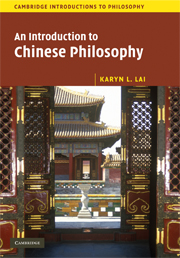Book contents
- Frontmatter
- Contents
- Preface
- List of Dates
- 1 Chinese Philosophy
- 2 Confucius and the Confucian Concepts Ren and Li
- 3 The Cultivation of Humanity in Confucian Philosophy: Mencius and Xunzi
- 4 Early Mohist Philosophy
- 5 Early Daoist Philosophy: The Dao De Jing as a Metaphysical Treatise
- 6 Early Daoist Philosophy: Dao, Language and Society
- 7 The Mingjia and the Later Mohists
- 8 Zhuangzi's Philosophy
- 9 Legalist Philosophy
- 10 The Yijing and its Place in Chinese Philosophy
- 11 Chinese Buddhism
- Postscript
- Glossary
- Bibliography
- Index
5 - Early Daoist Philosophy: The Dao De Jing as a Metaphysical Treatise
- Frontmatter
- Contents
- Preface
- List of Dates
- 1 Chinese Philosophy
- 2 Confucius and the Confucian Concepts Ren and Li
- 3 The Cultivation of Humanity in Confucian Philosophy: Mencius and Xunzi
- 4 Early Mohist Philosophy
- 5 Early Daoist Philosophy: The Dao De Jing as a Metaphysical Treatise
- 6 Early Daoist Philosophy: Dao, Language and Society
- 7 The Mingjia and the Later Mohists
- 8 Zhuangzi's Philosophy
- 9 Legalist Philosophy
- 10 The Yijing and its Place in Chinese Philosophy
- 11 Chinese Buddhism
- Postscript
- Glossary
- Bibliography
- Index
Summary
The philosophy of the Daodejing is discussed in this chapter and the next. A key concept of this text is dao, commonly translated ‘path’ or ‘way’. Dao is a notoriously difficult concept, arguably the most complex, in Chinese philosophy because of its use in both generic and specific terms and its applications in a wide range of domains including the religious, humanistic and naturalistic. The discussions in these two chapters will clarify some of the conceptions of dao in the context of the Daodejing. Yet, as we will see, the text itself, being a composite text that was not compiled according to a particular ‘school’ or doctrine, is also notoriously cryptic. Hence, the philosophy of the text is at some level an interpretive matter. However, significant modern and contemporary scholarship focuses on textual and philological study of how particular sections of the text, or its key concepts, relate to other doctrines and texts of the same period. Scholarship on the Daodejing has intensified as older versions of the text have been discovered at Manwangdui (in 1973) and Guodian (in 1993). The extant text, annotated by Wang Bi (226–249 CE), has been ascribed an earliest composition date of ca. 250 BCE. However, the Guodian bamboo slips have been dated at approximately 300 BCE and the Mawangdui silk scrolls at 200 BCE or earlier. These discoveries have added to issues of textual complexity as well as scholarly interest.
- Type
- Chapter
- Information
- An Introduction to Chinese Philosophy , pp. 71 - 92Publisher: Cambridge University PressPrint publication year: 2008



